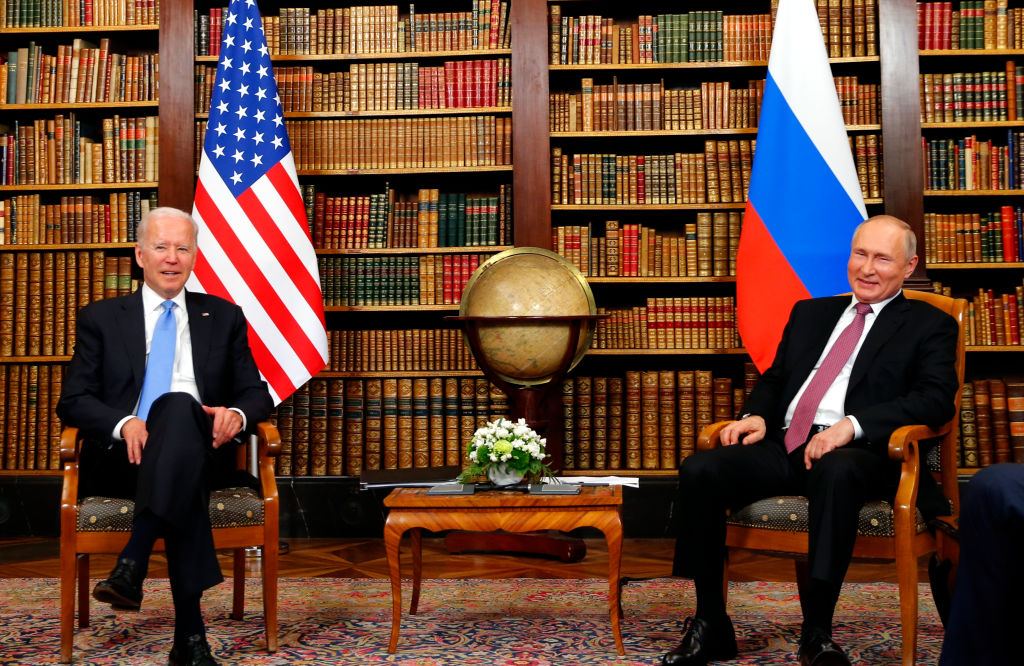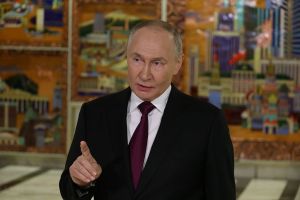President Joe Biden spoke with Russian President Vladimir Putin today via video conference for just over two hours, the second time in six months that the two leaders have engaged in a face-to-face conversation. For Biden, the message he sought to deliver was strict and to the point: if you, Mr. Putin, go ahead and order a second invasion of Ukraine in nearly eight years, you can expect a raft of economic penalties that will negatively effect everything from Russia’s access to the SWIFT payment system to the ability of Russian banks to convert rubles into dollars.
For the security-minded Putin, the meeting was an opportunity to press Biden on his principal demand: a written legal guarantee from Washington and the rest of NATO that Ukraine will not be invited into the alliance. Such a guarantee, of course, is practically impossible from the American perspective, as it would require intensive discussions within NATO and a series of votes in all thirty member states.
But for Putin, even the prospect of Ukraine becoming a NATO member is cause for concern at best and an existential danger at worst. Having the crown jewel of the former Soviet Union tucked under the NATO umbrella is simply intolerable from Moscow’s perspective — and the Russians are willing to pay a high price in order to prevent it.
The Biden-Putin call occurred within a highly volatile environment. According to the US intelligence community, approximately 70,000 Russian forces are deployed near the border with Ukraine, and the Russian military is putting in place the enablers, medical units, and logistical systems that would be necessary in the event that Putin orders an invasion. Moscow could launch such an operation as soon as next month. It would involve 175,000 troops and 100 tactical groups spread out across three or four locations, stretching the Ukrainian army thin. Ukrainian soldiers, jaundiced from eight years of war in the east of their country, are assuming it’s only a matter of time before they will have to face the mighty Russian army again.
Understandably, the Biden administration is trying to avert this scenario. In preparation for his call with Putin, Biden spoke with his German, French, Italian, and British colleagues to ensure that the West was working from the same playbook. The White House is currently discussing a bevy of economic sanctions against Russia strong enough to give Putin second thoughts about a Ukraine incursion, including freezing the personal assets of oligarchs inside or close to Putin’s inner circle (Russia, it should be said, is already the second-most sanctioned state by the US, with Iran taking top billing).
Whether the threat of more sanctions will have a deterrent effect depends entirely on Putin’s calculations. If he views military force as the only way to prevent another neighboring state from drifting permanently into the Western security orbit, then it’s difficult to see how additional restrictions on the Russian economy will deter much of anything. Right now, everything is up in the air.
For the United States, Ukraine is a diplomatic issue, not a military one. It would be a fool’s errand for President Biden to deploy combat forces near the line-of-contact in Eastern Ukraine, just as it would be foolish to provide Kyiv with an explicit security guarantee.
Fortunately, it appears the Biden administration recognizes this. As a senior administration official told reporters the night before the Biden-Putin video conference, “the United States is not seeking to end up in a circumstance in which the focus of our countermeasures is the direct use of American military force.” This is just as well: fighting a nuclear-armed superpower like Russia to defend a non-ally would be a colossal misjudgment of disastrous proportions.
There is, throughout Washington and European capitals, an understandable degree of sympathy for Ukraine’s position. Ukraine, after all, has been the victim of Russian aggression ever since the Maidan Revolution swept the bumbling Viktor Yanaukovych from power. The eastern industrial heartland remains carved between Ukrainian government forces and separatists who don’t view the authorities in Kyiv as legitimate. At least 14,000 Ukrainians have died in the Donbas, and Ukrainian troops are still being killed by mortar and sniper fire.
International affairs, however, are about power, not sentimentality. What we view as moral and just often doesn’t come to pass. Similarly, what we view as ugly and dirty is often the best scenario available.
In the Ukraine context, the best case scenario would be Kyiv undergoing the long, tedious, and (admirably) unpleasant process of implementing the Minsk II accords, which were negotiated in 2015 but have been defunct ever since. The Ukrainians have never liked the accords, having signed them at a time when their army was disintegrating and Russian forces were claiming gobs of territory in the east. But as much as Ukrainian politicians are loath to admit it, Ukraine is still the weaker power in this dispute — and Russia will not tolerate a separatist military defeat, no matter how much firepower Kyiv brings to bear.
Ukraine has three choices. One, it can attempt to retake the Donbas by force, which would result in an epic military catastrophe and the very Russian invasion it’s alarmed about. Two, it can try to sustain the muddled status quo and hope against all hope that Moscow will eventually tire of supporting its proxies. Or it can bite hard, buckle down, and negotiate a settlement giving the east the power to govern its own territory. This would be hard for the Ukrainians to swallow, but they can do so knowing such a scheme will have helped prevent a war they were bound to lose.
If Washington really cares about Ukraine, it will push for the third option.

























